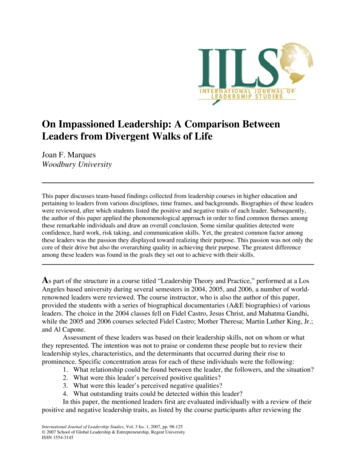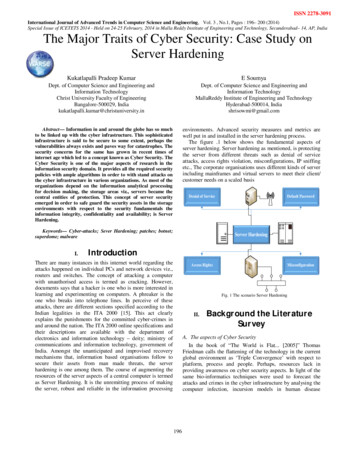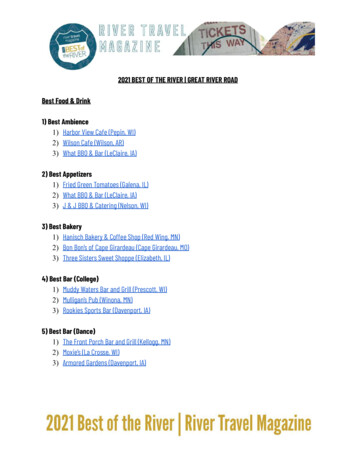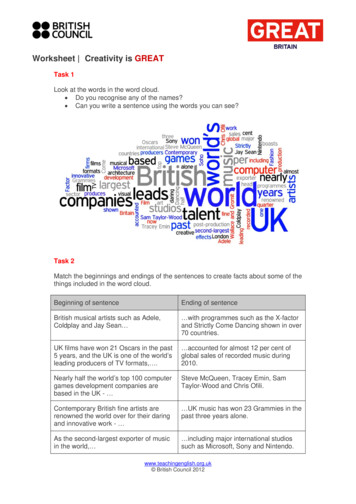
Transcription
11 Essential Traitsof Great ManagersA Culture Amp ebook
ContentsIntroduction 03A new breed of managers 04Project Oxygen 05Eight common traits of high-scoring managers 07Manager effectiveness 08How Culture Amp identified the most common traitsof successful managersThe 11 traits of great managers 10Hiring great managers 13Keep your performance evaluation awayfrom my people development 15Fair performance evaluation 17Effective people development 19Eight manager development ideas fromCulture Amp customers 2111 Essential Traits of Great Managers2
IntroductionFinding, keeping and developing great people isn’t easybut finding, keeping and developing great managers is evenharder. It’s hard in my own organization – a technologystart-up set to double in size over the next 12 months –and I’m sure it’s hard in yours too.What employees and employers expect of managers haschanged drastically in recent times. With new styles ofmanagement required, we need to revisit what we expectof managers, how we coach them and how we measurethe impact of learning and development initiatives.I hope this ebook gives you some tips you can use atyour organization. If our team at Culture Amp can beof assistance please don’t hesitate to reach out.Didier ElzingaCEOCulture AmpThe world's most powerful employee feedback and analytics platform11 Essential Traits of Great Managers3
A new breed of managersIt’s tempting to default to a command and control approach tomanagement, rather than giving individuals in the team freedom andautonomy. If managers aren’t equipped with the right skills to allowemployees more freedom, the concept can be intimidating.“Managers servethe team.Eric Schmidt, Executive Chairman, GoogleTech giant Google is a leader in the space of redefining the roleof managers. They deliberately decrease the level of power andauthority managers have over employees. “Managers serve the team,”says Executive Chairman Eric Schmidt. Managers aren’t focused onpunishment or rewards but on helping clear blocks and inspiring theirteams. One Google lawyer explains the dynamic with his inspiringmanager by borrowing a line from Jack Nicholson’s character inAs Good As It Gets: “You make me want to be a better man.”Google don’t just play lip service to these ideas. They genuinelybelieve that better decisions are made when multiple data pointsare collected and calibrated (and their research suggests they’recorrect). They’re specific about the decisions managers can’t makeunilaterally including:–– Whom to hire–– Whom to fire–– How someone’s performance is rated–– How much of a salary increase, bonus or stock grant someone gets–– Who is selected to win an award for great management–– Whom to promote–– When code is of sufficient quality to be incorporated intotheir software code base–– The final design of a product and when to launch it11 Essential Traits of Great Managers4
Project OxygenHow Google identified the traits of their mostsuccessful managersAlthough Google is one of the world’s most successful organizations,they’ve taken a sometimes winding road to success. It was 1996 whenLarry Page had the idea of downloading the entire internet. It tookweeks, and the project was originally called Backrub. Organizing theinternet and the backlinks to each site was a significant undertaking,and owners Larry Page and Sergey Brin weren’t keen to leave theirstudies at Stanford to focus on it. They tried to sell Backrub toAltaVista for one million dollars, and having failed, offered it to Excitefor 750,000. It turned out to be a stroke of luck that the offer wasalso unsuccessful.Google’s first explorations into alternative ways to manage (orrather, not manage) people weren’t particularly successful either.They’d always understood that engineers didn’t like, or want to be,managers, so with a staff of 400 people, they relieved every one oftheir engineering managers of their managerial duties. One personwas inundated with administration and people issues, teams becamedisorganised and the managers were quickly reinstated.So, now they knew that managers were necessary. Google’s MichelleDonovan, Director of People Operations posed the question: What ifeveryone at Google had an amazing manager? So Google embarkedon a new project to understand what that would look like. ProjectOxygen was christened in line with a trend of borrowing names fromthe periodic table. Donovan thought it was apt, “Having a goodmanager is essential, like breathing. And if we make managers better,it would be like a breath of fresh air,” she said.11 Essential Traits of Great Managers5
What makes an amazing manager? Google set out to find out with athorough research process. They knew it was the only way scepticalengineers would buy into the results. They first identified the bestof the best and the worst of the worst managers. They discoveredthat the teams who worked for the best managers were significantlymore certain that:–– Career decisions were made fairly. Performance was fairlyassessed and promotions were well-deserved.–– Their personal career objectives could be met, and their managerwas a helpful advocate and counselor.–– Work happened efficiently. Decisions were made quickly, resourceswere allocated well and diverse perspectives were considered.–– Team members treated each other non-hierarchically and withrespect, they relied on data rather than politics to make decisionsand were transparent about their work and beliefs.–– They were appropriately involved in decision-making andempowered to get things done.–– They had the freedom to manage the balance between workand their personal lives.They verified that managers had an impact on teams by tracking theperformance of employees who switched between teams that hadgood managers to teams that had bad managers and vice versa. Theyconsistently found that employees in teams with better managerswere more satisfied.In order to learn what good managers were doing that made themsuccessful, Google conducted double blind interviews (where neitherthe interviewer nor the manager knew if the manager rated as good orbad). Managers were interviewed about their style using the same setof questions. From the interviews, Google identified eight commontraits of high-scoring managers (see on following page).11 Essential Traits of Great Managers6
Eight common traits ofhigh-scoring managers1. Be a good coach2. Empower the team and do not micromanage3. Express interest/concern for team members’success and personal well being4. Be very productive/results-orientated5. Be a good communicator - listen and share information6. Help the team with career development7. Have a clear vision/strategy for the team8. Have important technical skills that help advise the teamThese give us a good idea of what it takes to be successfulat Google – but do you think they’re the right traits forevery organization?11 traits of great managers7
Manager effectivenessHow Culture Amp identified the most commontraits of successful managersProject Oxygen identified the core behaviors of good managers atGoogle. You’ll see they’re not particularly surprising (Google wassimilarly underwhelmed by their findings). There are probably a fewtraits you can think of that aren’t on the list. In looking at the traits ofeffective managers, our data and insights team at Culture Amp tookthings one step further. They conducted research with customersand reviewed current academic and practitioner research. Threemore behaviors were identified: a manager's ability to lead throughchange (emotional resilience), treat employees fairly and encouragediversity (fair treatment) and focus on progress, not just results(overall effectiveness). As a result, the team settled on 11 traits ofgreat managers.“It’s getting easier andeasier to arm managerswith feedback andcoaching to boost theirongoing learning anddevelopment.Myra Cannon, Insights Strategist,Culture Amp“Going from being an individual contributor to a manager can bea big (and scary) leap, and managers need support – not just inthe beginning, but as they grow into their own styles and refinetheir approach over time. Without feedback and guidance on whatthey can do to improve, managers are left to their own devices tofigure things out, often at the expense of the people they manage.It’s getting easier and easier to arm managers with feedback andcoaching to boost their ongoing learning and development – and wesee the rewards in more engaged managers, and teams, every day,”says Myra Cannon, Insights Strategist at Culture Amp.11 Essential Traits of Great Managers8
An example of Culture Amp's Manager Effectiveness insight report11 Essential Traits of Great Managers9
The 11 traits of great managersCaringCoachingManagers who are caring take time to get toknow the individuals in their team. They’regenuinely interested in people’s success andpersonal well-being and show this by regularlychecking in with people on how they’re goingboth at work and outside work.Managers who are good coaches focus ondeveloping the people they work with as wellas getting the job done. They ensure theyhave regular one-on-one meetings with teammembers and encourage them to presentsolutions to problems, rather than solvingproblems for them.“I’d consider speaking with my managerif I was thinking about leaving.”Example employee quote“I regularly get feedback from mymanager that I can put to use.”Example employee quoteCommunicatingDevelopmentManagers who are great communicators aregood listeners. They allow time for others tospeak. They have a clear understanding of theorganization’s vision and share it with the peoplein their team in a way that motivates them. Theykeep their team up-to-date on what’s happeningin the organization.Managers who show a genuine interest inemployees’ career development acknowledgeimprovement (not just deliverables). Theytake time to discuss people’s long-term careeraspirations and help them understand potentialcareer paths at and outside the organization.“My manager communicates avision that motivates me.”“My manager frequently recognizes progressI make, not just results.”Example employee quoteExample employee quote11 Essential Traits of Great Managers10
Emotionally resilientFair treatmentHow a manager behaves in challengingcircumstances can have a significant impacton their team. Managers who are emotionallyresilient are aware of how their mood affectsothers. They remain calm and productive underpressure and cope well with change.Managers who value fair treatment willallocate tasks and set schedules keeping inmind people’s capacity and development goals.They acknowledge good work. They build adiverse and inclusive team and encouragediversity of thought.“My manager stays calm whenwe’re under the pump.”“My manager makes sure that my ideasand work are attributed to me.”Example employee quoteExample employee quoteFostering innovationOverall manager effectivenessManagers who foster innovation empowertheir teams to make decisions – and learnfrom failures and achievements. They don’tmicromanage people. They encourageinnovative ideas and approaches and helppeople to implement them.Managers who are effective help people staymotivated to do their best work. They make thepeople they manage feel valued and supported.They feel they’re successful when the employeesthey manage are successful. People willinglyrecommend them as a good manager.“My manager helps me take my innovativeideas from concept to action.”“My manager is effective and motivatesme to do my best work.”Example employee quoteExample employee quote11 Essential Traits of Great Managers11
Results orientedTechnical capabilityManagers who are results oriented ensurethat performance standards are maintained.They work with team members to help removeblockers impeding tasks being completed andhelp the team get workable outcomes fromteam meetings.Managers with the required technical capabilityadd value to their teams. They can roll up theirsleeves and work alongside the team whennecessary. They empathize with the challengesthe team face and have the necessary skills tohelp devise solutions.“My manager helps me remove or work aroundthings stopping me getting work done.”“My manager has the technicalknow-how to help our team.”Example employee quoteExample employee quoteVision and goal settingA manager ensures the vision and strategy ofthe organization is translated into an actionablevision and strategy for the team. They helppeople understand how their role contributesto the organization’s success.“My manager helps us set a clear strategyfor achieving our goals.”Example employee quote11 Essential Traits of Great Managers12
Hiring great managersIt’s all very well to identify the traits we want to see in managers, butrecruiting people with the traits we’re looking for can be anotherchallenge entirely. Google offers these tips for finding great managers:–– Assess candidates objectively. Have standard interviewquestions and a way for interviewers to calibrate theirassessments of candidates–– Set a high bar for quality and keep looking until youfind someone better than the people you already have –someone who adds something new–– If possible, find your own candidates–– Give candidates a reason to joinYou may already h
Project Oxygen How Google identified the traits of their most successful managers 11 Essential Traits of Great Managers 5. What makes an amazing manager? Google set out to find out with a thorough research process They knew it was the only way sceptical engineers would buy into the results They first identified the best of the best and the worst of the worst managers They discovered that the .











